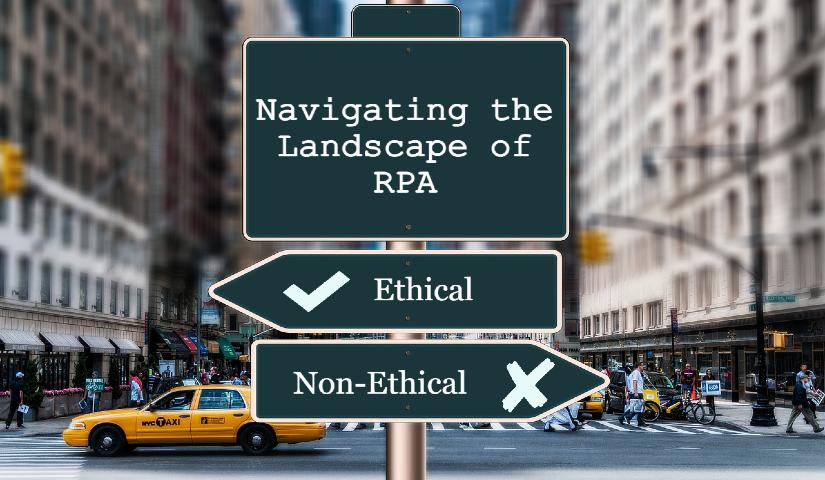
Navigating the Ethical Landscape of RPA: Challenges and Considerations
Robotic Process Automation (RPA) has emerged as a powerful tool for streamlining business operations, increasing efficiency, and reducing costs. However, as RPA technology advances and becomes more deeply integrated into various industries, it brings forth a set of ethical considerations that organizations must navigate. In this blog post, we'll delve into the ethical dimensions of RPA and the importance of addressing them.
The Ethical Dilemma
RPA, at its core, involves the automation of repetitive, rule-based tasks typically performed by humans. While this can lead to increased productivity and cost savings, it also raises several ethical concerns:
1. Job Displacement
One of the primary ethical dilemmas associated with RPA is the potential displacement of human workers. As tasks are automated, employees who previously performed those tasks may face job loss or redeployment to other roles.
2. Impact on Low-Skilled Workers
RPA may disproportionately affect low-skilled workers who are more likely to perform routine, manual tasks. Ensuring that these workers are not left behind in the automation revolution is an ethical imperative. It goes both ways, the organisations must come up with steps to upskill the existing workforce and the employees must be open to new ideas.
3. Privacy and Data Security
RPA involves the handling of sensitive data, raising concerns about data privacy and security. Ensuring that RPA systems comply with relevant data protection regulations is essential.
4. Accountability and Transparency
RPA systems make decisions based on predefined rules and algorithms. If these systems make errors or biased decisions, accountability becomes a challenge. Transparent decision-making and auditing mechanisms are crucial.
Ethical Guidelines for RPA Adoption
To address the ethical considerations surrounding RPA, organizations should consider the following guidelines:
1. Ethical Impact Assessment
Before implementing RPA, conduct an ethical impact assessment to identify potential risks and challenges. This assessment should include an analysis of the impact on employees, customers, and society at large.
2. Job Transition Programs
Implement job transition programs to support employees affected by automation. This may include reskilling and upskilling initiatives to help workers adapt to new roles within the organization. Employees need to understand that change is the only constant and they must not refrain from learning something new.
3. Ethical Frameworks and Guidelines
Develop and adhere to ethical frameworks and guidelines that guide the design, deployment, and operation of RPA systems. These frameworks should prioritize fairness, transparency, and accountability.
4. Data Governance and Compliance
Establish robust data governance practices to ensure the ethical handling of data. RPA systems must comply with data protection laws and regulations, and data access should be limited to authorized personnel.
5. Continuous Monitoring and Evaluation
Regularly monitor and evaluate the ethical impact of RPA within the organization. This includes assessing the performance of automated systems, addressing biases, and making necessary adjustments.
The Way Forward
While RPA presents ethical challenges, it also offers opportunities to enhance ethical practices within organizations. When implemented thoughtfully and responsibly, RPA can:
1. Improve Accuracy: RPA reduces the likelihood of errors associated with manual data entry and processing, which can lead to ethical and financial consequences.
2. Enhance Data Security: With proper data governance, RPA can strengthen data security and reduce the risk of data breaches.
3. Support Ethical Decision-Making: By providing data-driven insights, RPA can aid organizations in making more informed and ethical decisions.
RPA is a transformative technology that holds the potential to drive efficiency and innovation. However, addressing the ethical dimensions of RPA is paramount. Organizations must proactively consider the impact of automation on employees, data privacy, and accountability.
By adopting ethical guidelines, investing in employee development, and ensuring transparency and fairness in RPA systems, organizations can harness the benefits of automation while upholding their ethical responsibilities. In doing so, they can navigate the ethical landscape of RPA with integrity and compassion.
Stay tuned to Wyzbo’s blog space for more insights on how emerging technologies are shaping the ethical landscape of the business world.
Leave your comment

Empowering Businesses with Data Privacy Compliant Automation
Empowering Businesses with Data Privacy Compliant
READ THE FULL ARTICLE
The Digital Shift in Finance: Automating Supplier Invoice Processing
The Digital Shift in Finance
READ THE FULL ARTICLE
Automating Data Privacy: Smarter Compliance for the Digital Age
Automating Data Privacy: Smarter Compliance for the Digital Age In today’s fast-paced digital world, data is the lifeblood of every organization. With growing volumes of sensitive customer and business data, protecting privacy is a ...
READ THE FULL ARTICLE
Autonomous AI Agents: Ushering in the Next Era of Business Evolution
Autonomous AI Agents: Ushering in the Next Era of Business Evolution Welcome to the Age of Agentic Automation As digital disruption accelerates, businesses crave smarter, more adaptive systems. Traditional tools like Robotic Pr...
READ THE FULL ARTICLE